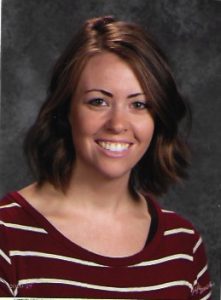On any given day, Winona State University alumna Whitney Ryan is responsible for the social and academic well-being of 300 high school students.
Even though Ryan’s caseload exceeds the 250:1 ratio of students to counselors recommended by the American School Counselor Association, the Kenyon-Wanamingo High School counselor feels fortunate that it’s not even higher, as is the case with many of her colleagues across the state.
According to Dawnette Cigrand, Ph.D., the director of WSU’s School Counseling Program, the State of Minnesota spends less of its education budget on support services for students than most other states. Statewide, Minnesota averaged just 1 school counselor to every 749 students in 2014.
“There aren’t enough counselors to give students the amount of attention they deserve,” Ryan said, who graduated from WSU’s Counselor Education program in 2016.
It’s an overwhelming situation for a recent graduate to face, but Ryan feels her education, along with the support she receives from her former professors at WSU, have prepared her well for the day-to-day challenges in the field.
“WSU allowed me the opportunity to learn from a staff of current or former licensed professional counselors who have had first-hand experience in supporting students academically and socially, handling crisis, and working within the education system,” Ryan said. “Now, in my career, I can still lean on my instructors for advice.”
According to Cigrand, job placement for WSU Counselor Education graduates is 100 percent for those completing post-graduate surveys, and the program is committed to continuing its advocacy work for graduates to ensure they are given the right tools to support academic achievement, college and career readiness, and social and emotional development of B-12 students.
Another focus of the Counselor Education program is working to establish more support within Minnesota for the proper funding for the counselors and children they serve.
“Our students are currently working on advocacy projects to share this information with key stakeholders, such as parents and community members,” Cigrand said.
Alumni of the program like Ryan can attest to the power behind the training received at WSU to make a difference—both directly with the children being served statewide everyday and as an advocate to improve state support for future generations of children and school counselors.
“WSU is addressing those needs by having an established, reputable and involved Counselor Education Department,” Ryan said. “They are at the forefront of training students who wish to be school counselors and with those students, instilling the need for advocacy within the profession.”
For more information, contact Cigrand at dcigrand@winona.edu.

